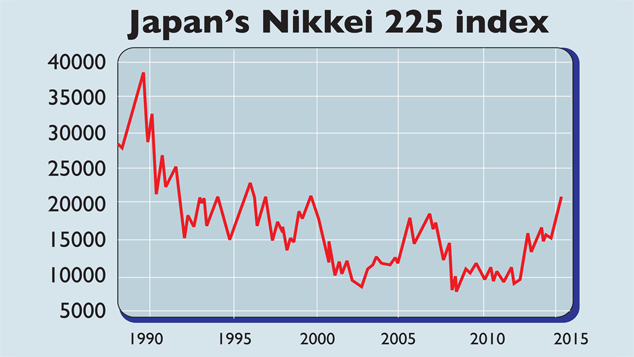Japanese stocks will bounce back
While Japanese stocks have had a summer they'll want to forget, don't write off the recovery just yet.

Get the latest financial news, insights and expert analysis from our award-winning MoneyWeek team, to help you understand what really matters when it comes to your finances.
You are now subscribed
Your newsletter sign-up was successful
Want to add more newsletters?

Twice daily
MoneyWeek
Get the latest financial news, insights and expert analysis from our award-winning MoneyWeek team, to help you understand what really matters when it comes to your finances.

Four times a week
Look After My Bills
Sign up to our free money-saving newsletter, filled with the latest news and expert advice to help you find the best tips and deals for managing your bills. Start saving today!

Japanese stocks have had a nasty summer, sliding by around 10% amid global jitters over China. But it isn't just the state of Japan's giant neighbour that has investors unnerved. "Abenomics", Prime Minister Shinzo Abe's plan to revive the economy after two decades of stagnation, "appears to have stalled", says the Financial Times. A key plank of Abenomics is a vast quantitative-easing (QE), or money-printing, programme, designed to produce inflation of 2%.
The Bank of Japan has been buying around $55bn of bonds a month. That's less than the monthly $85bn the US central bank bought under its QE programme, but in an economy three times smaller. Yet core inflation, which strips out volatile fresh food prices, has just fallen into negative territory for the first time in three years.
There is also little sign so far of inflation expectations and wages rising. In the year to July, earnings rose by just 0.6%. "Consumers still appear shell-shocked" by last year's rise in the consumption tax (VAT), says the FT. That "knocked the wind out of the recovery".
MoneyWeek
Subscribe to MoneyWeek today and get your first six magazine issues absolutely FREE

Sign up to Money Morning
Don't miss the latest investment and personal finances news, market analysis, plus money-saving tips with our free twice-daily newsletter
Don't miss the latest investment and personal finances news, market analysis, plus money-saving tips with our free twice-daily newsletter
Meanwhile, progress on structural reform has been relatively slow. One key task, says The Economist, is to prepare the population for more immigration to make up for the shrinking workforce. "Keeping low-paid foreigners out is one reason why, in the five years to 2012, about half a million Japanese stopped work to care for their ageing parents."
Still, the gloom looks overdone. The Bank of Japan could boost its QE purchases as soon as next month, reckons Capital Economics. That should mean further yen weakness, giving Japan's exporters another boost. Meanwhile, although the structural reforms remain a work in progress, lower corporate taxes and improvements in corporate governance are bullish. State pension funds are also being encouraged to buy equities.
Japan enjoys "an impressive lead" in industries such as medical devices, robotics and high-performance materials, says Fidelity's Tom Stevenson in The Sunday Telegraph. It also spends more on research and development than anywhere bar South Korea. On top of that, says Capital Economics, Chinese data are set to improve as stimulus measures work their way through, and the yen's fallcould gain impetus if American interest rates rise further or faster than currently expected. The consultancy thinks the Nikkei could gain another 30% by the end of 2016.
Get the latest financial news, insights and expert analysis from our award-winning MoneyWeek team, to help you understand what really matters when it comes to your finances.

-
 Should you buy an active ETF?
Should you buy an active ETF?ETFs are often mischaracterised as passive products, but they can be a convenient way to add active management to your portfolio
-
 Power up your pension before 5 April – easy ways to save before the tax year end
Power up your pension before 5 April – easy ways to save before the tax year endWith the end of the tax year looming, pension savers currently have a window to review and maximise what’s going into their retirement funds – we look at how